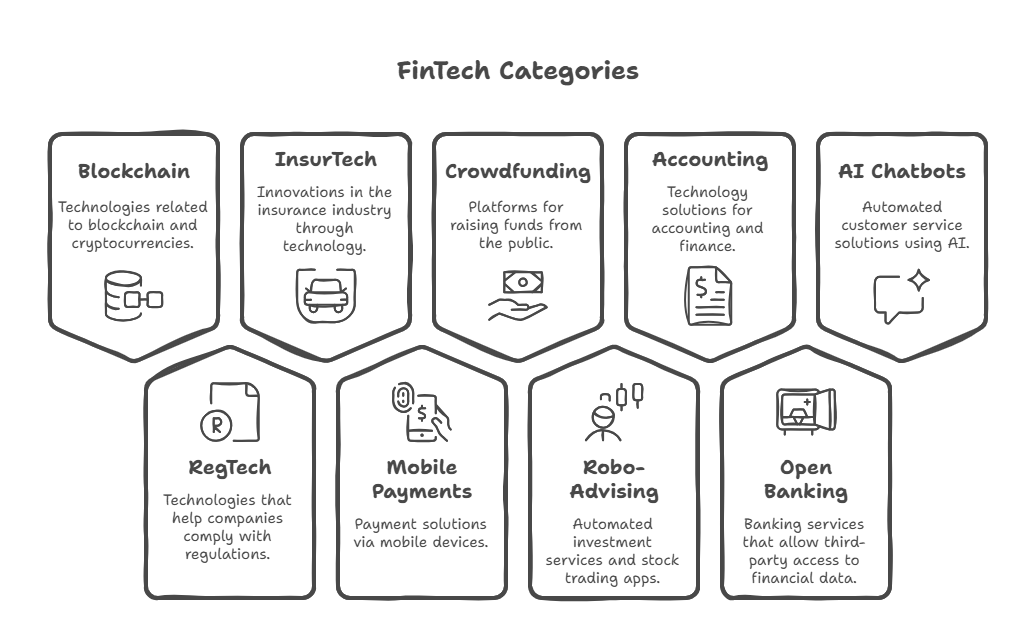FinTech Topology
FinTech encompasses a diverse range of technologies and services, continuously evolving with technological advancements. Here's a breakdown of key FinTech categories:
1. Blockchain and Cryptocurrencies:
-
Blockchain:
- A decentralized and secure digital ledger technology that facilitates transparent and secure transactions.
- Enables peer-to-peer transactions, cross-border remittances, and smart contracts.
- Drives financial innovation through consensus algorithms.
-
Cryptocurrencies:
- Digital currencies based on blockchain technology, such as Bitcoin and Ethereum.
- Enhance transaction privacy, security, and transparency.
- Significant growth in crypto wallet ownership worldwide.
2. Regulatory Technology (RegTech):
- A subset of FinTech focused on improving regulatory compliance through technology.
- Automates compliance processes and facilitates regulatory analysis.
- Uses automation and data analytics to enhance risk management and compliance.
- Examples: Continuity, Regis-TR, and Provenir.
3. Insurance Technology (InsurTech):
- Leverages technology to improve the efficiency and administration of the insurance sector.
- Modernizes services like policy purchasing, servicing, and claims processing.
- Integrates smart apps, AI, and machine learning to enhance customer experience.
- Enables personalized insurance products.
4. Mobile Payments:
- Facilitates digital transactions through mobile devices.
- Popular platforms include PayPal, Apple Pay, Venmo, and Google Pay.
- Increased adoption due to the shift towards cashless transactions.
- Security and trust are key considerations.
5. Crowdfunding:
- A bottom-up microfinance practice that raises funds through online platforms.
- Provides individuals and small businesses with access to capital.
- Simplifies fundraising and eliminates the need for traditional bank loans.
- Enables SMEs to attract investors and improve loan processes.
6. Robo-Advising and Stock-Trading Apps:
-
Robo-Advising:
- Automated investment platforms that provide portfolio recommendations through algorithms.
- Offer low-cost investment solutions, rebalancing, and risk management.
- Enhance efficiency and accessibility for portfolio managers and investors.
-
Stock-Trading Apps:
- Enable convenient stock trading through smartphones.
- Offer user-friendly interfaces and low-cost trading options.
- Replaced the traditional brick and mortar stock exchanges for most retail investors.
7. Accounting:
- Utilizes machine learning, AI, cloud computing, and digitized tax platforms to enhance accounting automation and transparency.
- Improves data access and analysis through software and tools.
- Reduces the time required for tasks like invoice management and cash flow forecasting.
8. Open Banking:
- Enables the sharing of financial information through secure APIs.
- Facilitates access to financial data through a regulated digital marketplace.
- Allows third-party developers to create innovative services like budget management tools and digital lending.
9. AI Chatbots:
- Provides automated customer service and support through AI-powered chatbots.
- Enhances efficiency and accessibility for both corporate and consumer needs.
- Growing rapidly in adoption.


No Comments